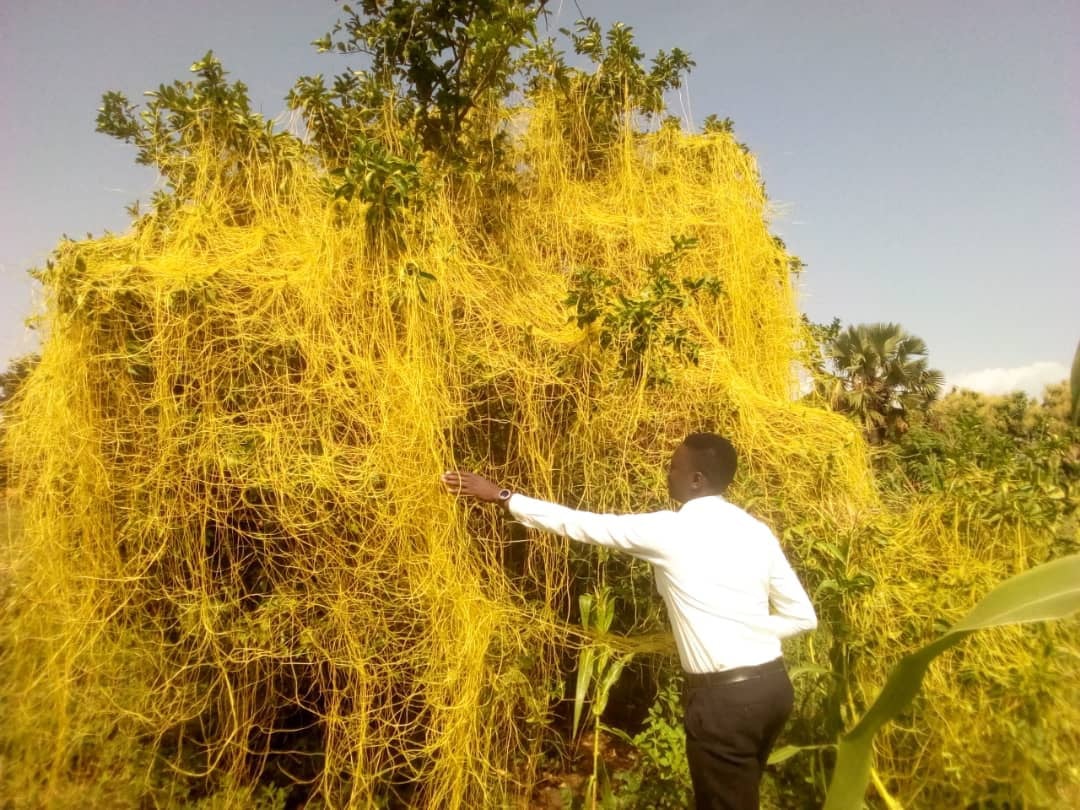Deadly weed threatens citrus growing in Teso

A citrus tree covered by the yellow weed in Kumi District. The weed feeds on the plant’s sap and moisture on the tree barks and grows rapidly, suffocating the citrus plant with its canopy. PHOTO/GEORGE MURON
What you need to know:
- The weed is interfering with the normal growth cycle of the trees by limiting their flowering and fruiting capacity.
The commercial production of citrus fruits in Teso is being threatened by the emergence of a deadly weed, golden dodder, which is wiping out some farms.
There is an estimated 8.2 million productive citrus plants in Teso.
Some of the fruits are consumed locally, others sold to the Soroti fruit factory for processing and the rest are supplied to other parts of the country and Kenya.
However, the invasion of the golden dodder is threatening the yielding capacity of citrus trees.
The weed is interfering with the normal growing cycle of the trees by limiting their flowering and fruiting capacity.
The parasitic weed, locally known as the yellow weed, attaches and hangs on the host plant before fully engulfing it.
The weed feeds on the plant’s sap and moisture on the tree barks and grows rapidly, suffocating the citrus plant with its canopy.
Mr Patrick Angus Opolot, a farmer in Nyero Town Council, Kumi District, says the canopy suffocates the host plant and leaves it vulnerable to limited or no access to sunlight.
“When it spreads over to cover the host tree, it squeezes it and restrains it from growth. It cuts the tree from accessing sunlight and eventually kills it,” Mr Opolot says.
“The weed is affecting us badly, it hinders the plant from flowering well hence reducing the normal yielding capacity,” he adds.
Mr Jonathan Okwi, another citrus farmer in Asuret, Soroti, says he has lost 70 citrus plants as a result of the parasitic weed.
He adds that to destroy the dodder, the farmer has to cut down all the affected trees.
Mr Jorem Opian Obicho the chairperson of Teso Tropical Fruit Farmers Cooperative Union, says their attempts to raise the matter to the line ministry have not yielded results.
“We have discussed that yellow weed at a higher level and they promised to take action. However, nobody has brought feedback,” Mr Opian says.
He says the losses are growing, hindering the production of citrus fruits in Teso.
Mr Opian explains that the weed is dispersed by people who are ignorant of its negative effects.
“Whereas some people think it’s beautiful, the dodder is a destructive weed that can ruin the productive trees,” he says.
Ms Winnifred Aool Opio, an entomologist at Naro, describes the golden dodder as a pest that destroys crops and trees.
“Its effects on plants are diverse, not only in Teso but also in Buganda and other parts of the country,” Ms Aool says.
What leaders say
Mr Rajab Ogogol, the production officer for Kumi District, told this newspaper yesterday that the Golden Dodder weed is widespread across Teso sub region.
He said there is no definite chemical that is being used to clear the weed.
Mr Ogogol said what the government is doing is to sensitise the farmers on how to control the weed.
He added that the plant has been in existence in the country for some time, but the only solution to it is to have it removed mechanically.
“The weed should be picked off the mother plant, dried and burnt,” Mr Ogogol explained.
Looking back
In 2020, the government through the ministry of Agriculture earmarked Shs5 billion to facilitate weed control activities.
Among those targeted weeds were the golden dodder, congress and salvinia molesta weeds.
Dr Ambrose Ogona, the director general of the National Agriculture Research Organisation (Naro), in an interview during a review meeting of the National Agriculture Advisory Services activities in Teso Sub-region in Kumi District then confirmed that the funds would be spent on conducting a countrywide survey and research programmes on the weeds.However, two years have passed and the dodder weed has not been destroyed.




